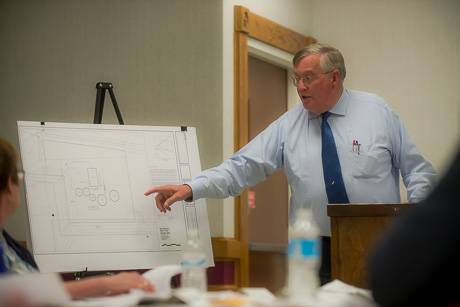
The backers of a proposed bio-gas plant in the Genesee Valley Agri-Business Park are in the early stages of site planning and they hope, if all goes to plan, to be operational in a year.
The plan was presented for review Thursday night to the Genesee County Planning Board and the board unanimously recommended approval at this stage of the process.
The plant would take organic waste from food processing plants -- primarily the two yogurt plants in the ag park -- and convert it into methane to generate heat that could be resold to the plants and electricity that the plants could also purchase.
The plant would generate more electricity than the plants could use -- enough to power 800 homes a day -- so additional capacity would be transferred into the electrical grid.
The plant, said architect Robert Keiffer, of TY Lin International, Rochester, is environmentally friendly, would help make the yogurt plants more sustainable and more efficient to operate, and help attract business to the ag park.
The owners of the plant would be CH4 Biogas, which already operates a plant in Covington.
CH4 has a purchase agreement with Genesee County Economic Development Center for five acres in the ag park. The project would be eligible for economic incentives from GCEDC.
The proposed facility would be 8,500 square feet, housing processing equipment, an office, bathroom, dock area and de-packaging area.
The waste accepted by the facility would be organic and non-hazardous. The waste would go through a methane-capture process, pumped into a grinder and put into a receiving tank.
The waste is then pasteurized in three 15-foot-high tanks. This optimizes methane release. Next, the waste is moved to digester tanks that are completely enclosed. Methane is collected and stored in another tank. It is then converted into electricity by a CHP engine. The engine is not located on site, but at the thermal end-user's location and enclosed to reduce noise.
The organic waste, if not sent to a digester plant, could be used on farm fields or simply taken to a dump. In either case, the methane eventually released by the waste would drift into the atmosphere. Methane is considered a greenhouse gas. This process captures 100 percent of the methane from the waste and converts it to electricity.
